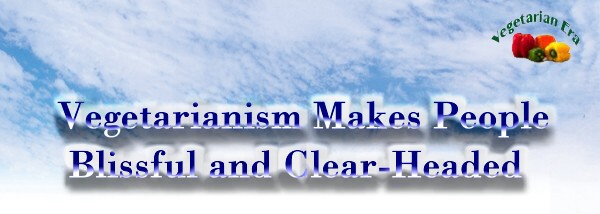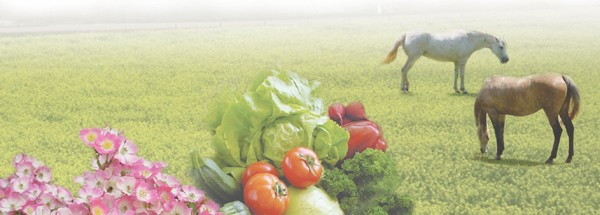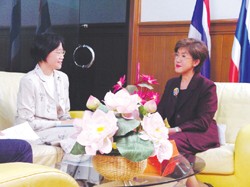A: Yes, in Sumphanthawong, which is located in downtown Bangkok and has a large Chinese population. We have several communities in Bangkok where large numbers of people are vegetarian. Because of the excellent vegetarian food available in the area, nearly eighty percent of the inhabitants adhere to a vegetarian diet for spiritual reasons. This conforms to the Buddhist tradition, makes people happy and keeps them conscious and alert. The festival is sponsored by many groups including the Quan Yin Buddhists.

An exclusive interview with Ms. Nathanon Thavisin,
Deputy Permanent Secretary of the Bangkok Metropolitan Administration(Originally in Thai)
Ms. Nathanon Thavisin, Deputy Permanent Secretary of the Bangkok Metropolitan Administration, (first on right) conducts an exclusive interview on the A Journey through Aesthetic Realms TV program. Foreword:
Each year the Festival of the Nine Imperial Gods is celebrated in Thailand at various times in September or October according to the lunar calendar. During this ten-day activity, most Buddhists maintain a vegetarian diet, suspend all entertainment and hold a wide range of celebrations in Buddhist temples. This year, Bangkok’s Chinatown hosted the main festivities, which featured a series of exhibitions on vegetarian food and ingredients. Ms. Nathanon Thavisin, Deputy Permanent Secretary of the Bangkok Metropolitan Administration, visited each exhibition booth to express concern for the people. Through God’s grace, Ms. Thavisin met with the Video Team of the A Journey through Aesthetic Realms TV program and gave an exclusive interview the following day to propagate the vegetarian ideal.
Note: As Deputy Permanent Secretary of the Bangkok Metropolitan Administration, Ms. Nathanon Thavisin holds a status similar to that of the Mayor of Bangkok, the city’s highest administrative officer. She has a doctoral degree in environmental protection and is dedicated to ecological conservation, national movements and vegetarianism.
Q:How do you plan to transform Bangkok into an international metropolis?
A: This is the common wish of many Bangkok residents. They want to see their city become a major tourist destination as well as an important venue for international conferences and cultural events, such as the Vegetarian Festival or Festival of the Nine Imperial Gods.
Q:The Vegetarian Festival lasts ten days and attracts many people to Yaowarat (Chinatown). Can you tell us about the purpose of and your expectations for this festival?A: The event celebrates the ancient story of Princess Quan Yin, who came to this world to remind us to show compassion to all living beings. Under her influence, many Chinese and Thai people have chosen to pursue a vegetarian diet. During these ten days, people refrain from meat consumption and eat only vegetables and vegetarian products. The past few years have seen a significant increase in the production of soy and soy-flour products. The resultant diversity in vegetarian foods has made it easy for people to switch from meat-eating to a more compassionate diet.
Q: Do you plan to hold similar activities in other areas?Q:In the twenty-first century, many Asian countries as well as the USA, Canada and Germany are encouraging people to observe a vegetarian diet, so that they can lead a more harmonious life. Can you comment on this?A: We do want to promote vegetarianism. People will feel the benefits if they make an effort to reduce their intake of meat or stop eating it altogether. The vegetarian diet helps prevent many illnesses such as cancer and heart problems. Medical research has shown that consuming vegetarian food contributes to better health. A healthy body brings personal joy and happiness for the family.
Q: Why are vegetarianism and meditation becoming more popular in many countries?A: Meditation takes us into a state of peace and enhances our inner wisdom. This in turn brings about greater contentment and allows for better control over the emotions. If we meditate every day and follow a more spiritual lifestyle, the benefits can be felt very quickly. Then we will be able to serve others better and be a good example for society.
Sakyamuni Buddha taught us to contemplate our inner selves in order to gain wisdom. Meditation is very important. I meditate when I travel in the car and before I go to bed. Once our minds are calm, we understand that everything is ephemeral. My children also meditate. Sometimes they try to persuade me to go to the temple, but I tell them that it’s not necessary to go there because we can meditate at home or in a quiet place. Being in samadhi for fifteen to forty-five minutes or even an hour calms the mind for the rest of the day. But we must practice regularly, even during sleep or while walking around the house.
I do my best to practice meditation. However, I think that it’s not only meditation that counts but also how we conduct ourselves in daily life. For instance, we should ask ourselves, “What do you want to do today? What have you done today? Have you been a positive influence on those around you? Have you told them about the benefits of meditation and the vegetarian diet?”
Thank you very much for setting up this interview and for sharing your Method and the advantages of a vegetarian diet. Vegetarian food is becoming increasingly popular in Thailand as people realize that it is good not only for physical wellbeing but for the mind and spiritual cultivation as well.
This interview and the Vegetarian Festival will soon be available for on-line viewing on the Sun TV program A Journey through Aesthetic Realms at:
http://www.Godsdirectcontact.org.tw/eng/hichannel/index.htm(spoken in Thai, with English subtitles)

